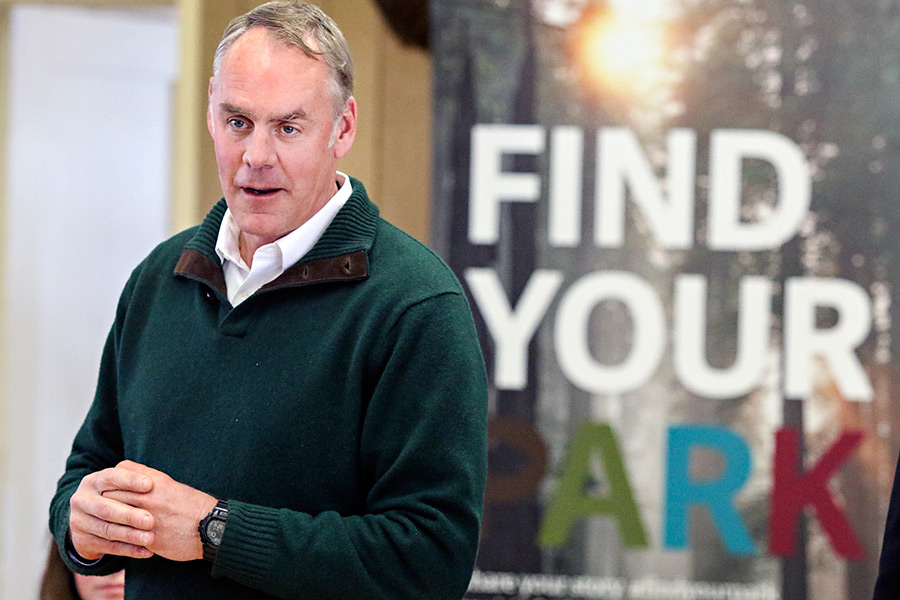Reports that Interior Secretary Ryan Zinke inappropriately waded into the U.S. Senate’s fraught debate on Obamacare repeal last week drew widespread criticism from Democrats and prompted a Whitefish-based watchdog group to file a public records request and threaten to sue the federal agency.
The firestorm of controversy relates to allegations that Zinke threatened retribution against Alaskans after Republican Sen. Lisa Murkowski joined Democrats in voting against the GOP’s health care repeal effort.
The Alaska Dispatch News reported July 26 that Zinke spoke with U.S. Sens. Murkowski and Dan Sullivan, R-Alaska, shortly before the Senate failed to pass a GOP replacement plan for Obamacare.
Sullivan told the Dispatch News he found the call “troubling,” adding that Zinke mentioned that Murkowski’s vote could have an impact on economic development work in the state.
The reports created an instant controversy, with Democrats calling for an investigation into Zinke’s conduct.
According to E&E News, Zinke called the reports that he threatened retribution “laughable.”
But Chris Saeger, executive director of the Western Values Project in Whitefish, said he intends to prove that the Interior Secretary from Whitefish overstepped his bounds.
His energy-development watchdog group filed a Freedom of Information Act request for all records related to Zinke’s alleged threat, which reportedly centered on stifling issues that are a priority to Alaskans, including “nominations of Alaskans to Interior posts, an effort to build a road out of King Cove through the Izembek National Wildlife Refuge, and future opportunities to drill in the Arctic National Wildlife Refuge and expand drilling in the National Petroleum Reserve-Alaska, among other regulatory issues that are a priority for Murkowski and Sullivan,” according to the Dispatch News.
“Secretary Zinke’s leadership at Interior is as sloppy as it is corrupt,” Saeger said. “To threaten a senator over an issue unrelated to Interior’s business is beyond the pale. These reports show that the Department of the Interior has abandoned its land management mission and has become another tool for the Trump administration to intimidate its political adversaries.”
The allegations come on the heels of reports that Zinke has meddled with land managers on local issues, including issuing a mandate to Glacier National Park officials to loosen motorized boating restrictions designed to combat the threat of aquatic invasive mussels to Lake McDonald.
One day later, park officials reversed course, calling some of the changes to its aquatic invasive species emergency response “premature” and explicitly stating that the move was “not directed by the Department of the Interior,” despite an internal memo obtained by the Beacon in which park officials expressed frustration at having to rush changes to the plan online at the height of summer.
The Beacon has filed a Freedom of Information Act public records request with the Interior Department seeking information about the extent to which Zinke pressured park officials.
Also last month, Zinke reportedly demanded that the park’s most prominent climate scientist and the park’s superintendent be prohibited from participating in a highly publicized visit by Facebook founder Mark Zuckerberg.
Heather Swift, spokesperson for the Interior, issued a statement July 20 defending the department’s actions after the Washington Post published a pair of stories revealing that the Interior blocked the federal employees who are considered experts in climate science from meeting with Zuckerberg, an advocate for addressing climate change and a vocal critic of President Trump, who has said climate change is a hoax and chose to withdraw the U.S. from the Paris climate accord.
The Washington Post reported that Swift “made it clear that she did not want Glacier National Park Superintendent Jeff Mow involved in the tour.” The National Park Service’s public affairs staff was also instructed not to post anything about Zuckerberg’s visit on Glacier Park social media accounts, the Post reported.
The Interior Department also blocked Dan Fagre, a well-known scientist with the U.S Geological Survey who has conducted seminal research on climate change, from meeting Zuckerberg, as was previously planned.
Fagre told the Beacon he was scheduled to meet with Zuckerberg, but then was inexplicably informed that he was prohibited from participating in the visit.
In a post published on Twitter, Swift defended the most recent actions. Swift noted Glacier Park’s crowded summer and stated, “allocating extensive government resources at the taxpayer expense to a celebrity would have been a waste of taxpayer money and a disservice to average park-goers.”
